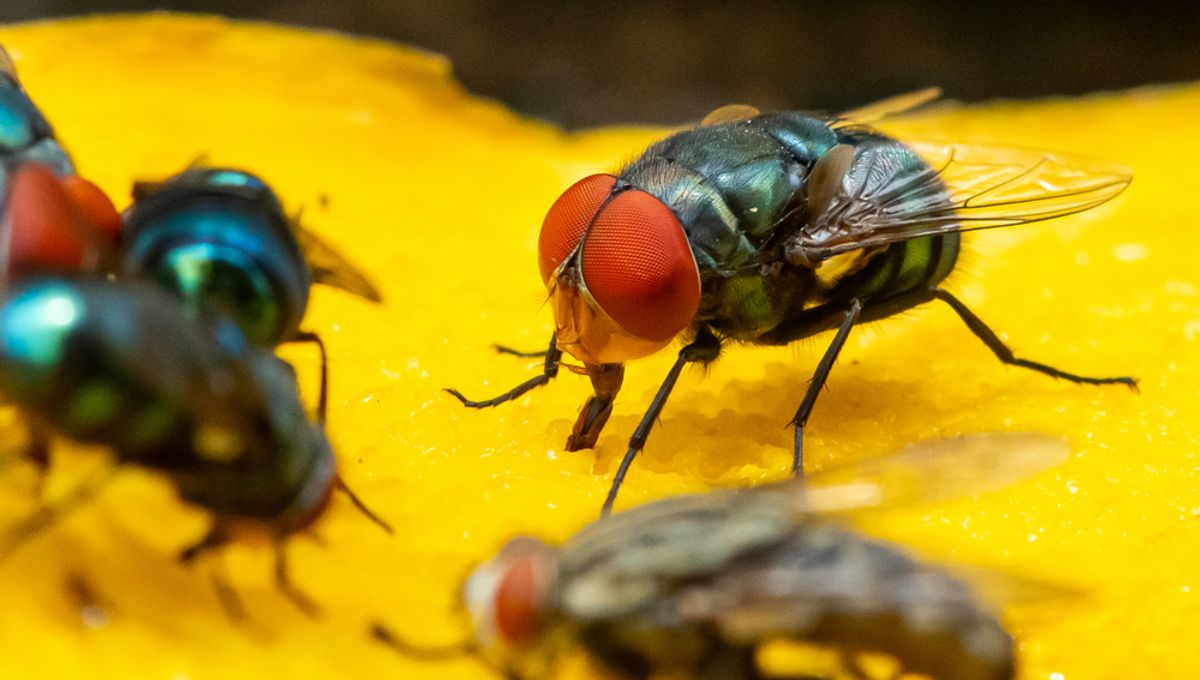
Imagine the upset: a gang of hairy houseflies arrive at your dinner without an invitation and take a seat on top of your favorite dish. They take a few steps, rub their grubby hands together, puke, then rudely leave. Is your food still safe to eat?
Generally speaking, the risk of falling sick is relatively low, but there are a few factors to consider when deciding whether a fly-landing means it’s trash time for your lovingly prepared meal.
Do flies vomit when they land?
No offense to Mother Nature, but houseflies are gross little creatures. The rumor is true that they throw up on your food when they land on it. Since flies don’t have teeth and jaws to chew food, they spit out some enzyme-rich saliva to partially dissolve the food and suck it up through their snout-like mouth.
They spend most of their short lives feeding on organic decaying material, which will include rotting vegetation, raw meat, and – of course – steaming piles of poop. Living this grimy lifestyle means they harbor a number of nasty germs that have the potential to make you sick.
“House flies serve as bridges between clean and unclean environments, moving freely between contaminated materials such as waste to domestic and peridomestic environments, food and water sources,” a paper about houseflies from 2017 reads.
What germs are spread by flies?
One review managed to identify 130 pathogens from houseflies. These included fungi, viruses, parasites, and bacteria, some of which were “serious and life-threatening species.”
In many parts of the world, the main threat is the risk of foodborne pathogens. These germs have the potential to cause a nasty bout of food poisoning, including vomiting, nausea, stomach pain, diarrhea, and fever.
A study from 2022 saw scientists collect over 100 houseflies from around a farm in New York and found they were loaded with an array of foodborne pathogens that affect human health, including Salmonella, Escherichia coli, Staphylococcus aureus, Bacillus cereus, and Bacillus subtilis.
The question is whether these pathogens are abundant enough to make a healthy person ill. This is dependent on a few factors, namely how many flies have settled on the food and for how long.
If a single fly has brief contact on freshly cooked food, then most health experts would say it’s not a big deal and there’s no need to chuck the food.
However, if a swarm of flies has been feasting on your meal for hours, then it’s best to use your common sense and discard the food.
In parts of the world where tropical diseases are more prolific, it’s wise to note the threat level is higher. Houseflies can harbor pathogens from human waste and pass on deadlier diseases like cholera and shigellosis, a type of dysentery, for several days. The level of threat is not clear, but research has linked the density of housefly populations with increases in shigellosis among kids in Bangladesh.
Altogether, the health risk of a lone fly making brief contact with fresh food is relatively low, especially if you’ve got a relatively strong immune system. However, a risk is present and it can be higher depending on the situation.
As ever, it’s not a bad idea to stick to the age-old mantra of “if in doubt, throw it out.”
Source Link: A Fly Lands On Your Food, Is It Still Safe To Eat?